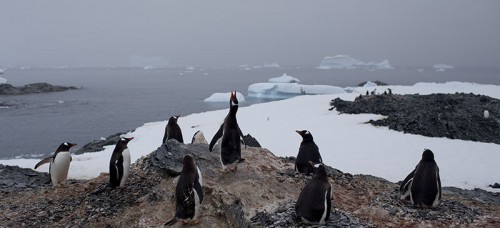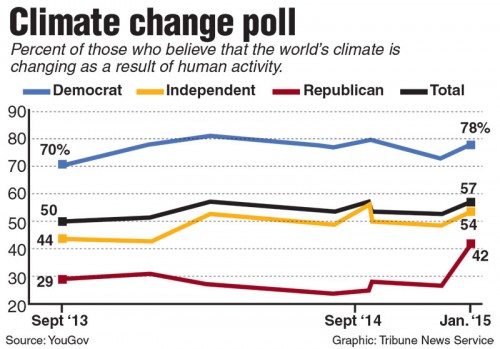Examining the Guardian’s unapologetic stance on the environmental crisis

Prominent news sources are often thought of as reliable because of their ability to remain objective when reporting current events. The Guardian’s recent climate change campaign is redefining activism, and at first glance it may seem that the revered quality of objectivity is at stake. However, this campaign hits at an important public question: is the issue of climate change really up for debate?
Last March, Alan Rusbridger, editor of the Guardian, announced that the publication would engage in a six-month campaign to do “justice to this huge, overshadowing, overwhelming issue of how climate change will probably, within the lifetime of our children, cause untold havoc and stress to our species.”
This editorial decision will change the British newspaper’s coverage of climate change, as the Guardian “will assume that the scientific consensus about man-made climate change and its likely effects is overwhelming,” Rusbridger said. “We will leave the skeptics and deniers to waste their time challenging the science. The mainstream argument has moved on to the politics and economics.”
Rusbridger’s decision rests upon the fact that climate change can no longer be debated. Furthermore, the Guardian isn’t just going to ignore climate deniers, but they are also calling on the Wellcome Trust and the Bill and Melinda Gates Foundation to “remove their investments from the top 200 fossil fuel companies and any commingled funds that include fossil fuel public equities and corporate bonds within five years.”
Here is where the economics of climate change come into play. The deniers of climate change rest their cases on the negative effects that acknowledging climate change has for their businesses.
For example, the founding family of ExxonMobil, the Rockefeller family, has been trying for years to get the US oil company to change their ways and give up climate denial.
The Guardian released an article about ExxonMobil and the Rockefellers on March 27, to which ExxonMobil issued the statement, “ExxonMobil will not respond to Guardian inquiries because of its lack of objectivity on climate change reporting demonstrated by its campaign against companies that provide energy necessary for modern life, including newspapers.”
Clearly, ExxonMobil is not on board with the Guardian’s campaign. And why should they be? Maybe, for the sake of the environment and the future of humanity? Nope. ExxonMobil sees profitability as a first priority. Our home and its inhabitants come second.

The call for divestment is certainly the most controversial part about the Guardian’s campaign, but the Guardian is also partaking in its own divestment to ward off claims of hypocrisy. As stated on the Guardian’s website, “The Guardian Media Group (GMG) has committed to selling all the fossil fuel assets in its investment fund of over £800 ($1.18 billion), making it the largest yet known to pull out of coal, oil and gas companies.”
“I don’t see any ethical concerns regarding the campaign, unless advertising was being tied to coverage,” said adjunct professor Joe Cappo, an expert on media business and ethics.
The Guardian has addressed the concern of advertising by stating, “the Guardian believes that editorial independence is essential. We have a strict policy of not allowing advertisers to influence editorial content.” Essentially, they are addressing further hypocrisy claims that pertain to the fact that the Guardian is still taking advertisements from fossil fuel companies.
But to the claims of those who say the Guardian is ruining their credibility by not remaining objective on the climate change debate, Cappo said that the Guardian “is well within their journalistic rights…the scientific evidence (for climate change) is so strong.”
Perhaps political scientist W. Lance Bennett and journalist William Serrin said it best in their essay “The Watchdog Role of the Press,” “What is the point of the construction of a two-sided debate about global warming when one side consists overwhelmingly of scientists who have little scholarly doubt or disagreement, and the other side consists primarily of politicians and business interests who have quite another agenda fueling their skepticism?”
Bennett and Serrin argue that watchdog journalism has become over-stylized or ritualized. American journalism as a whole is failing in their watchdog role.
This role is essential for a functioning democracy, but “the press has adopted a tone of cynicism and negativity often without offering original documentary material or constructive solutions to accompany that goal,” Bennett and Serrin said.
The American public needs efforts such as the Guardian’s unapologetic climate change campaign. It not only has the potential to inspire people into action, but it brings back investigative journalism to its rightful place in democracy.








High Treason • Jul 29, 2015 at 12:17 am
Wake up world, “climate change” is constantly occurring. It is either getting warmer or it is getting cooler. What is up for debate is whether it is caused by human activity, if it is significant and serious, and lastly, will changes in human activity make any significant difference.To just claim that “climate change” or “global warming” is not up for debate is not only totally unscientific, but positively fraudulent. The “solutions” being called for to combat “climate change” are same as were proposed back in the 70’s when scientists were convinced we were heading for an ice age- abandoning human technology and society which is based on the fruits of carbon recycling.
Wake up world, the calls to destroy society would not normally gain traction. The refusal to debate the issue should get us all suspicious of the motives. LIARS routinely wheedle out of discussing issues-they know the truth will destroy them. We have all had to deal with liars. Look at the MO – identical, isn’t it. Giving the air of respectability is the greatest tactic of liars. The bigger the reputation created, the further the scam progresses before being uncovered. The time has come to uncover the grandest scam in 70 years-the UN, the chief promulgators of the cAGW/climate change hoax. Remember, the same “solution” was proposed for the ice age which was “imminent” in the 70’s. Bit strange- either burning to oblivion or freezing has the same “solution”- destroying society.
Time to WAKE UP.
mememine69 • Apr 12, 2015 at 8:28 pm
What debate.
It’s been 34 YEARS of FAILURE at achieving climate action goals needed 25 YEARS ago to SAVE THE PLANET.
It’s unstoppable denial that is certain.
The last 34 YEARS of science’s 97% certainty gave us 34 YEARS of climate action FAILURE and still “believers” don’t WANT science to say it’s “certain”.
Who’s the fear mongering neocon?